Find out more about how gardening helped P to spend time outside, connect with people and feel a sense of purpose.
We spoke to someone we support about his gardening hobby. He uses the name ‘Papa Yap Yap’. It is the name his family call him because he talks so much! Here, we call him ‘P’.
Future Pathways supported P with his gardening hobby. This included getting a polytunnel and gardening equipment. Polytunnels are made from steel and covered in thin plastic. The polytunnel protects what is inside it. The sun heats up the inside of the tunnel and this warms the plants, vegetables and soil inside, helping them to grow.
P started gardening after one of his daughters said that he needed something to take his mind off things. He also thought it might bring him a sense of pride.
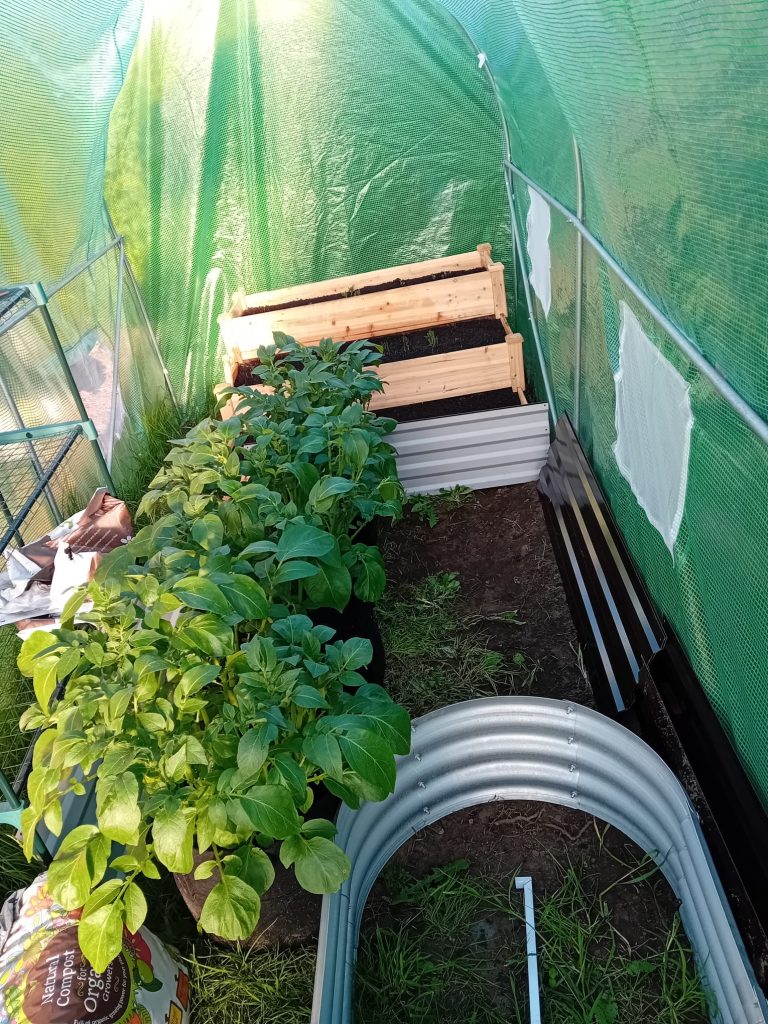

‘I’ve turned my life around. My ‘get up and go’ is now back.’
The new gardening items mean P can now grow his own vegetables and herbs in his back garden. He has grown tomatoes, potatoes, onions, peppers and chillis.
‘Tomatoes are the most difficult. I’m most proud of my tatties because of the way they came out – they were tiny but tasty.’
Gardening also helps P to get out of the house. P needs to look after his vegetables and herbs every day because they need help to grow.
‘I’d rather be in my hut and my garden than in my house. I have to go out because it needs my attention.’
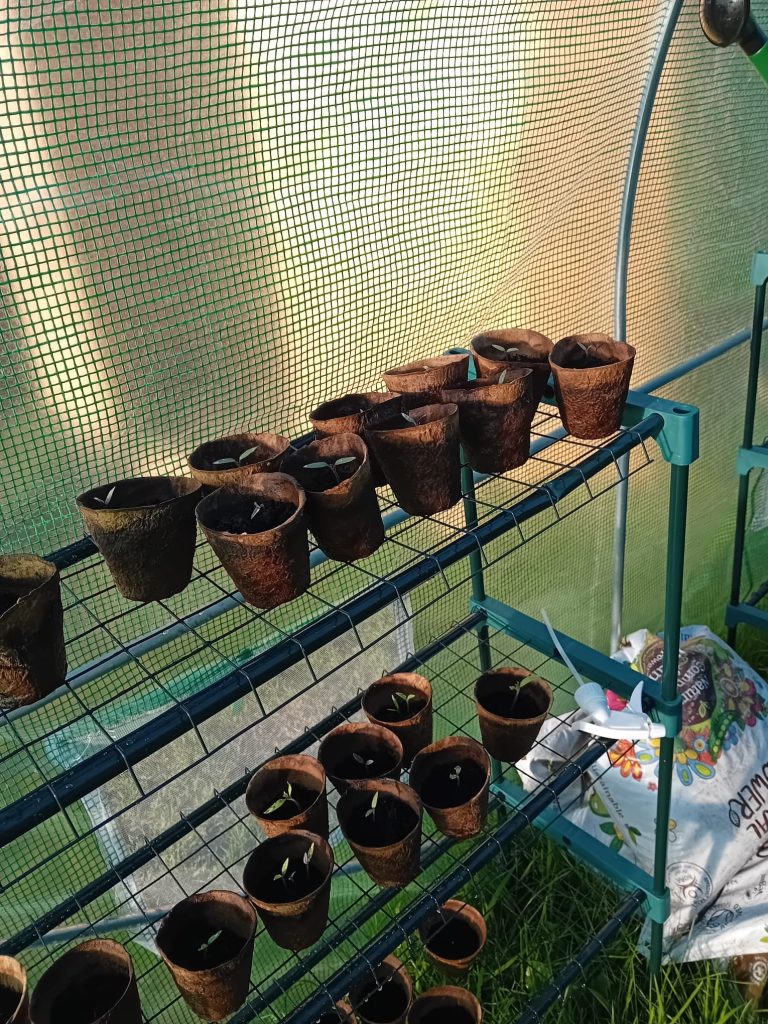
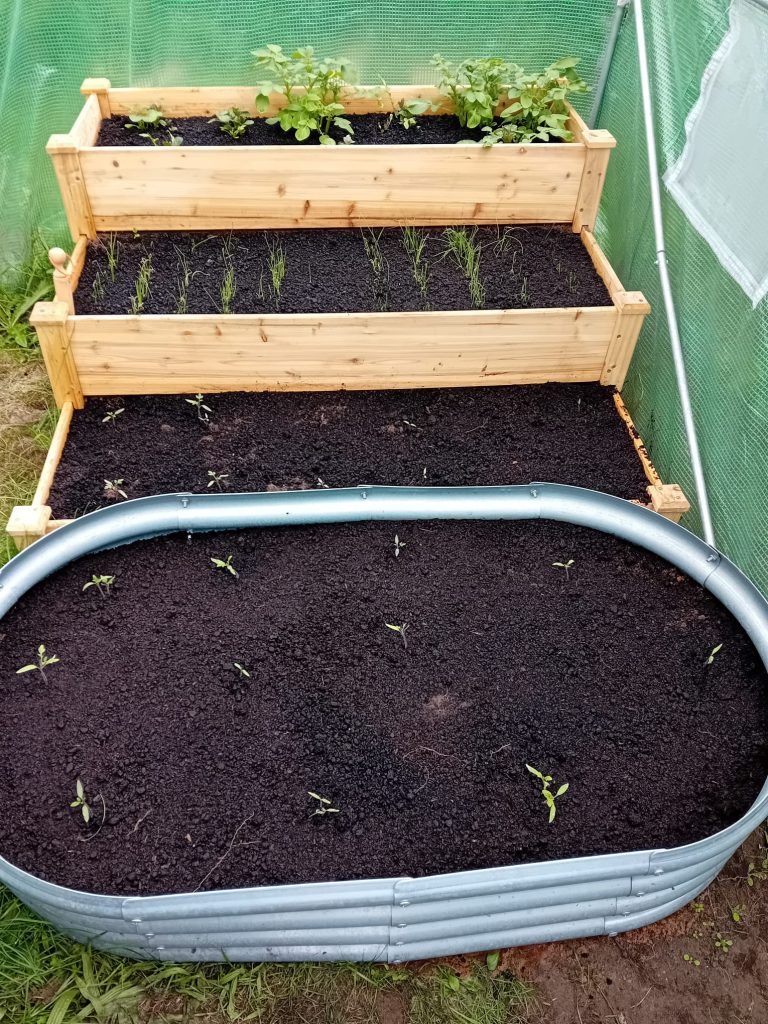
Gardening also helps P to connect with other people. It is something he can talk about with others.
This new hobby has given P a sense of purpose and a feeling of pride. P is hoping to get another polytunnel so he can plant different things. Next he wants to try growing leeks and beetroot.
‘The pride I get is from growing a seed to a plant to giving the vegetables away. I feel I have more purpose. I’ve got a wee glow about me now.’
Top tips
From growing plants at home to taking time outside, being in nature can boost our wellbeing. You can find top tips in our Going Green feature:
www.future-pathways.co.uk/going-green
Here, Trevor shares his thoughts on writing about your own experience.
My thoughts on writing about your own experience
I realise not all who are care experienced would want to write about their own lives which may have been permanently impacted by abuse. The process requires you to revisit painful past memories and look closely at the many ways they still impose themselves onto your life.
Nonetheless, writing and reflection offers an opportunity to gain insight on how you feel and why you feel the way you do in your life now in the present. Writing your story can be a journey toward healing some of your pain and I would advise anyone with care experience to think about writing to gain more clarity.
Future Pathways and The Book Whisperers helped me more than words can explain to record and review my experience. I know from the requests and comments that my story has proven useful to readers. That means my story is worthwhile to me and others.
I would encourage people to get their story out there. It could help you, and it could help another person too.
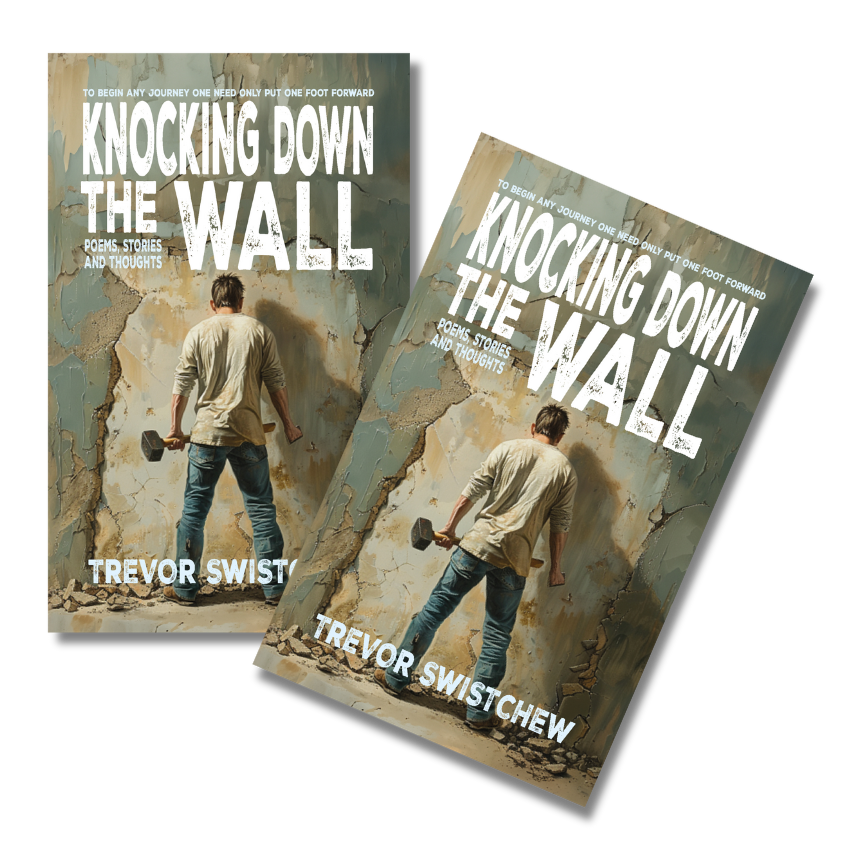
Knocking Down the Wall
Trevor’s latest book is now available. It is called Knocking Down the Wall. It is a collection of stories and poems. In the book, Trevor talks about the challenges of his childhood. But he also talks about his healing journey. He describes confronting and overcoming his past. The book is available on Amazon here.
Discover more
A good night’s sleep can boost your mental health. Here, we share top tips from First Psychology.
Sleep is an important part of our lives. It helps us with our physical and mental health. Good quality sleep can help us feel refreshed. It can help us get ready for the day ahead.
If you find it hard to sleep well, you are not alone. When we sleep badly, we can feel very tired. We can wake up feeling annoyed. And it can be hard to focus on the things we need to do through the day.
Sleeping badly can happen to lots of people. It can happen more when we feel stressed or worried.
What does ‘good sleep’ mean?
Good sleep means:
- You fall asleep within 30 minutes of going to bed.
- You sleep all the way through the night. You do not wake up more than once during the night.
- You get the right amount sleep. Adults should try to sleep for 7 to 9 hours a night.
- You feel refreshed when you wake up.

Tips to improve your sleep
Create a routine.
Go to bed at the same time every night. Try to get up at the same time every morning too.
Try things that can help to relax before bedtime.
Some people find yoga can help them to relax before bed. Some people find it helpful to read or to listen to an audio book. Nice smelling candles and herbal teas can be soothing. A hot water bottle can help you feel more restful.


Get exercise at the right time.
Keeping active during the day helps us get tired for bedtime. Getting outside in the morning can help us sleep better at night. But doing exercise too close to bedtime can make it harder to fall asleep.
Watch what you drink.
Caffeine can affect our sleep. Try not to have coffee or energy drinks late in the day. Alcohol can affect our sleep too. It can make it harder to stay asleep through the night.


Switch off your devices.
The light from phones, tablets and laptops can affect our sleep. Try to switch them off an hour before you go to bed.
Write down your worries.
If you find yourself worrying at bedtime, keep a pen and paper beside your bed. Writing down your worries can help to stop them going round in your head and help you feel more peaceful.
Try not to get frustrated.
If you are finding it hard to sleep, try not to get angry about it. Get up and try a gentle activity, like reading. Then go back to bed when you feel more sleepy.
Find what works for you. Try to be kind to yourself when you are tired.

This article is adapted from a booklet called ‘Sleep better, feel better’. It is written by First Psychology. First Psychology are one of our Delivery Partners. They offer different kinds of therapy, like counselling, psychotherapy and coaching. They are based in Edinburgh but they have offices in lots of places.
You can find out more about them at www.firstpsychology.co.uk
You can see the full booklet at: www.firstpsychology.co.uk/booklets
As the year draws to a close, we want to thank our valued Delivery Partners for working in partnership with Future Pathways in 2024.
Our work together this year
- We worked alongside a network of 51 Delivery Partners offering a wide range of different types of support.
- At least 118 people registered with us – 15% of people accessing Future Pathways – were accessing Delivery Partner support.
- At least 10 people accessed support from more than one Delivery Partner.
- At least 75 people started accessing support from a Delivery Partner.
We also asked our Delivery Partners for feedback through our annual Delivery Partner Feedback Questionnaire. We wanted to know more about what it is like for Delivery Partners to work with Future Pathways, and about the impact of our work together. We received responses from 18 Delivery Partners providing a range of different types of support such as counselling, housing support, and trauma support work. Here are some key findings from the questionnaire.
Our approach


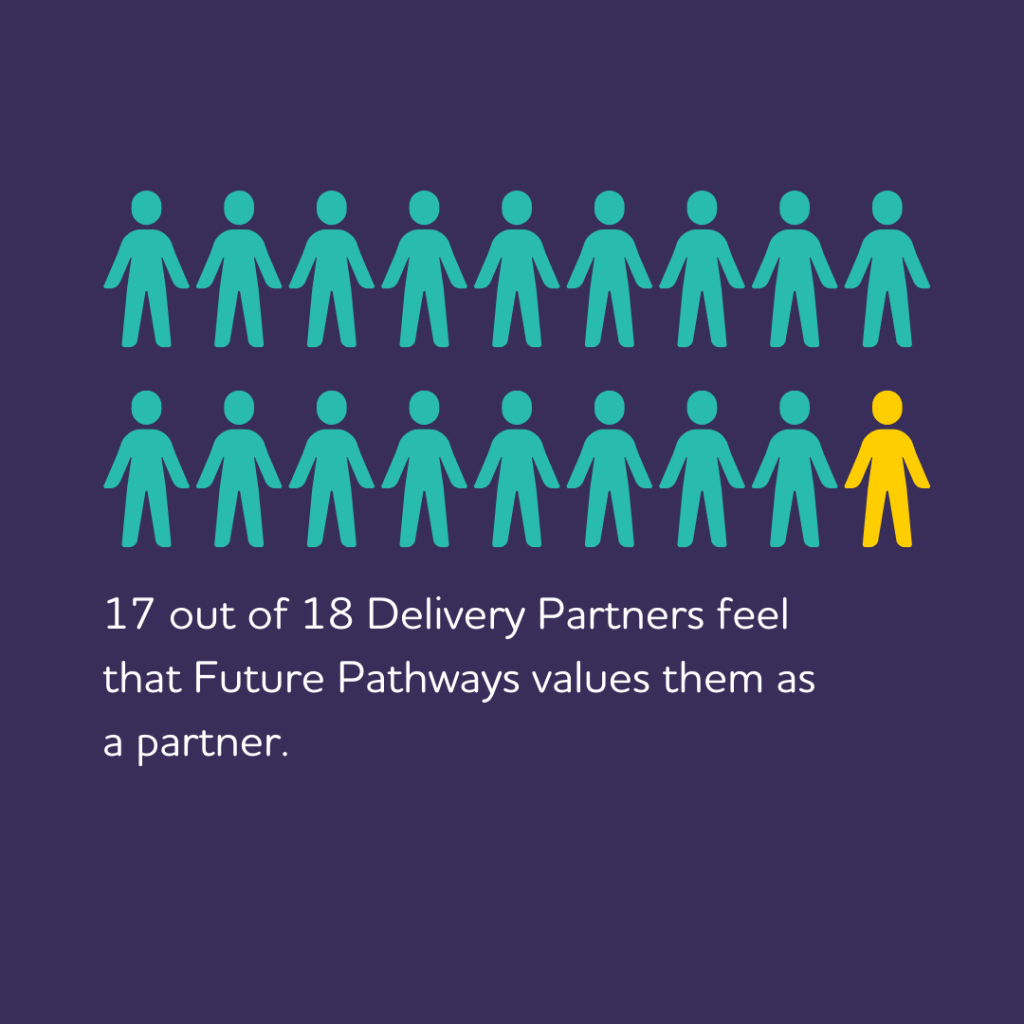
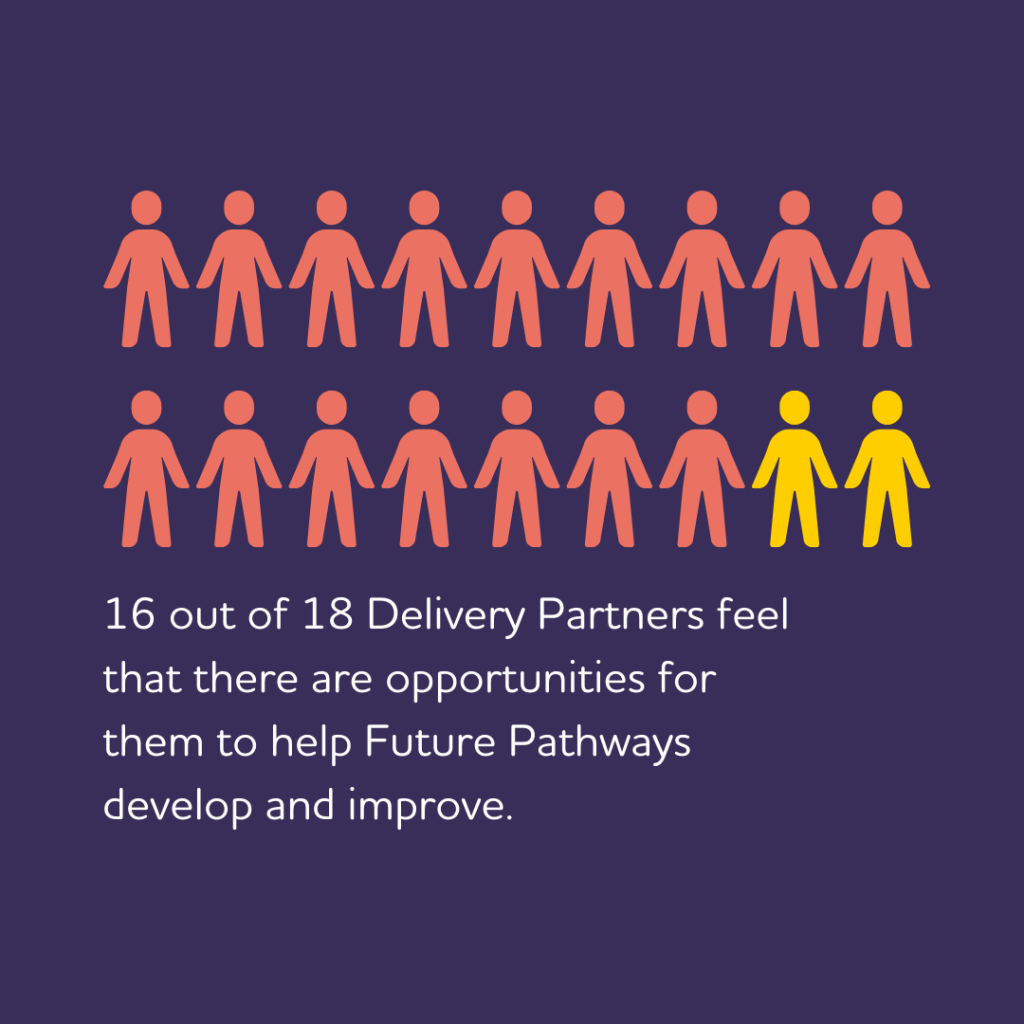
Most respondents told us that working with Future Pathways is different from working with other services because our support is focused on the person; we communicate effectively with our partners; and we are supportive of the work our Delivery Partners do. Delivery Partners used words such as “responsive” “supportive” and “caring” to describe our approach. But the most used word to describe our approach was “collaborative”. This word cloud shows the words our Delivery Partners used to describe our approach.
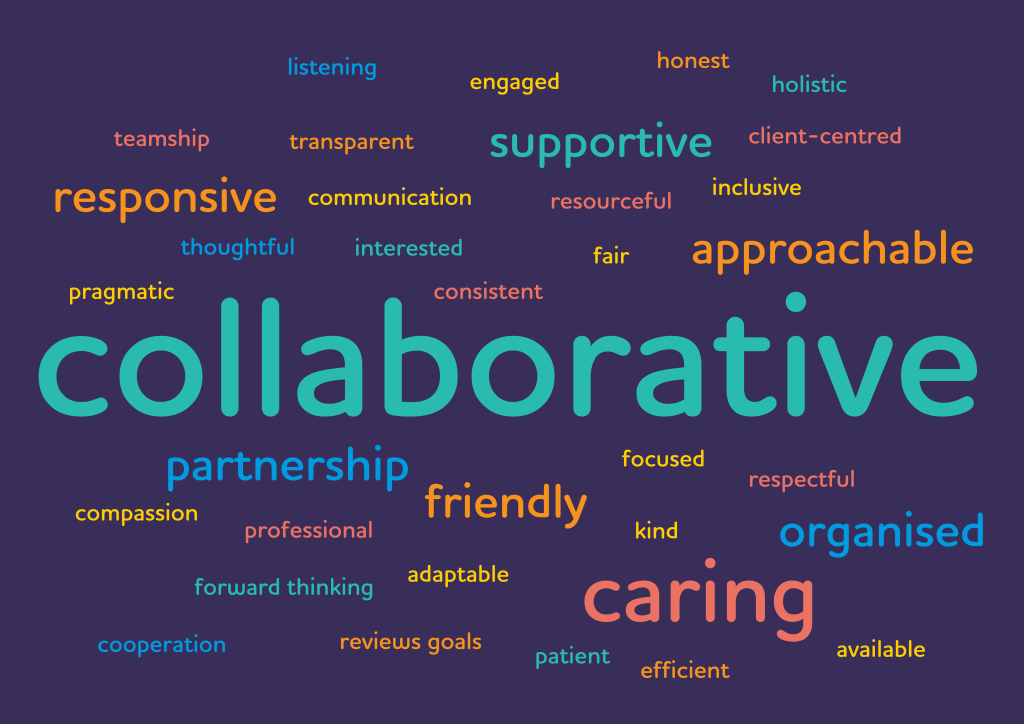
Our impact for Delivery Partners
One of Future Pathways’ outcomes is to make trauma informed support more accessible to people registered with us. And we can see from the feedback we received that this is a big part of the difference we make for our Delivery Partners.
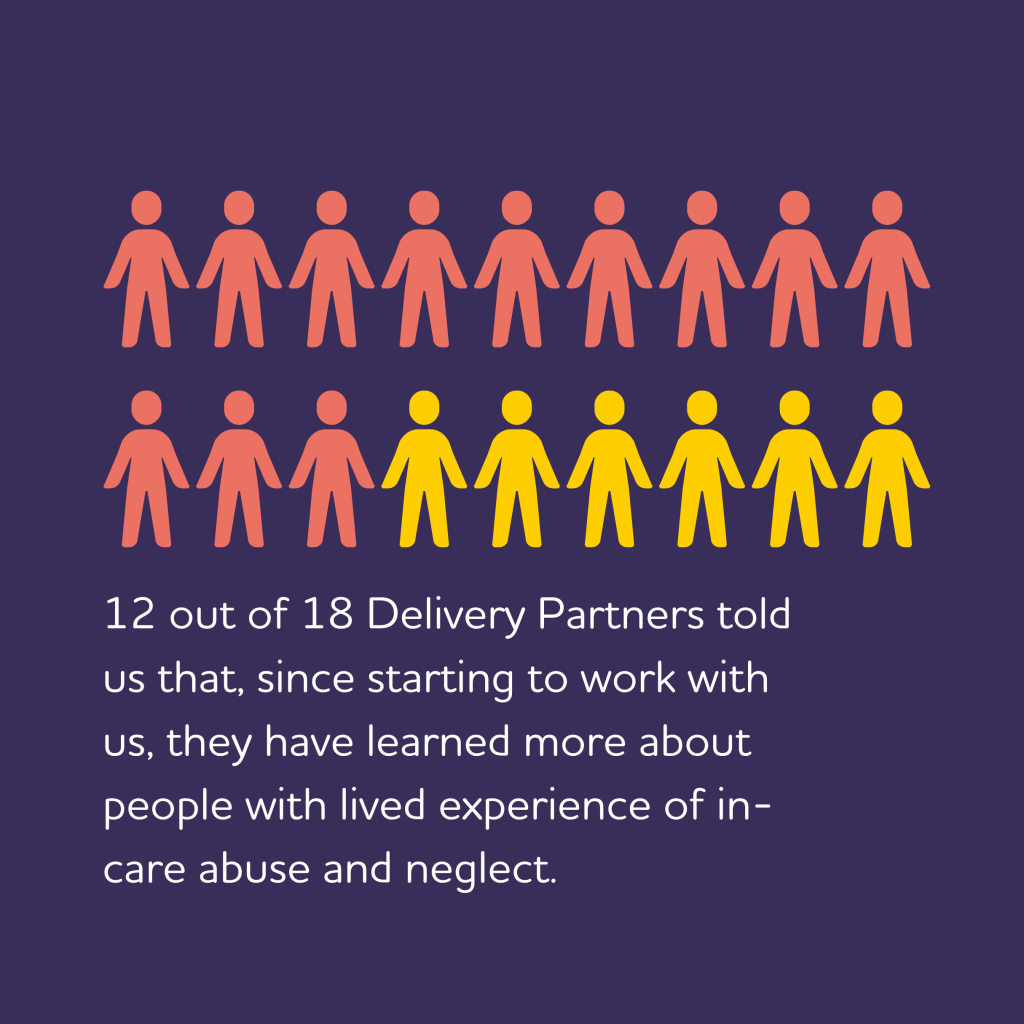
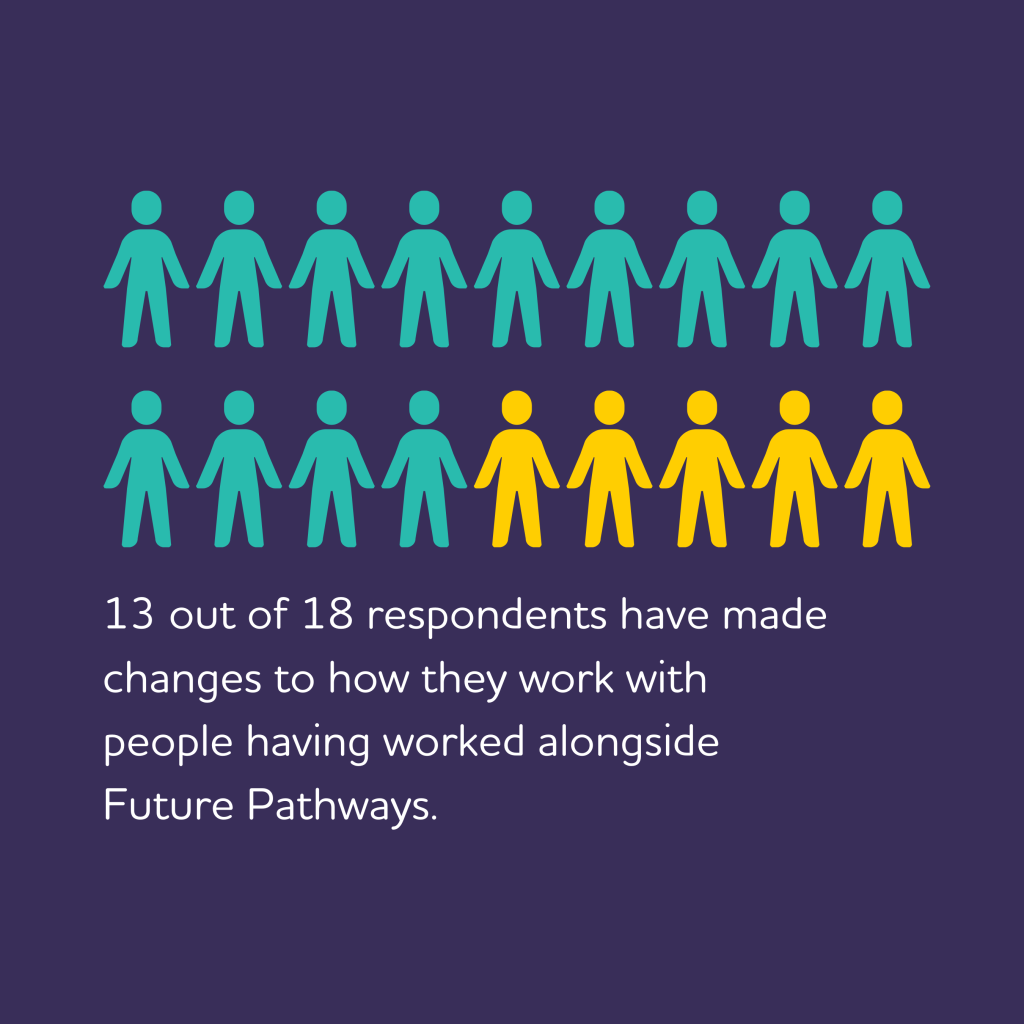
“I have learned that trauma can cause a wide range of physical and emotional symptoms” – Delivery Partner
“I notice that I encourage clients to believe in themselves and to analyse what parts of their lives they feel are challenging” – Delivery Partner
Future improvements
Feedback from our Delivery Partners has also helped us learn how we can improve. While most of the feedback we received was complementary, we also received some suggestions about how we could improve. For example, considering when we review contracts with our Delivery Partners and looking at how we can best measure progress towards people’s goals.
We look forward to continuing to work alongside our Delivery Partners to develop our service, and enhance the support accessed by people with lived experience in 2025.
Find out more about the difference we make
Pathways to Change is our latest impact report. Here, we take an in-depth look at the work of Future Pathways from April 2023 to March 2024. This report helps us to gain a deeper insight into how we make a real difference, and where there is scope for improvement.
Here, we share some tips from Health in Mind about how to help others and
yourself during the winter season.
For many people, winter can be a difficult time. We might feel lonely, stressed or sad. We might see our friends or family finding things hard too. Something we can do that can really help is to give the gift of kindness – to others and to ourselves.
Spotting loneliness
This time of year can be connected to being with friends or family. But when we don’t have people near us, we might feel more alone. If you are feeling lonely, try to reach out to people you trust. They might be feeling lonely too. A phone call, letter or a text might help to make a big difference.

Do things your own way
For some, Christmas, New Year, and other celebrations or traditions that happen over winter, can bring up a lot of difficult feelings, and that is OK. If you do not want to take part in traditions or celebrations, you do not have to. You can let people, including yourself, choose what feels comfortable.

Helping others
Knowing that you are helping others feel good can boost your own wellbeing. It can give you a sense of purpose, community and connection. You could donate or volunteer at your local community hub. You could shop locally to try to help small business. Or you could raise awareness of important causes on social media, like charities you support.

As 2024 draws to a close, we want to take this opportunity to reflect on the support people have accessed at Future Pathways, and the difference this has made to people’s lives.
Our latest impact report published this year showed that our support is vitally important to many people registered with us for many reasons. For example, we know that many people we support experience multiple health and social inequalities, such as living in areas where services can be more difficult to access.
Our work focuses on addressing these inequalities so that people with lived experience of in-care abuse and neglect can live full, healthy and independent lives. While each person’s journey at Future Pathways is unique, this snapshot of our work this year shows that our support has, in different ways, helped many people find their own way to a better life.
This data was drawn from January to November 2024.
People continued to register with and access support at Future Pathways. This year:




People continue to give us feedback that our trauma informed approach is effective.




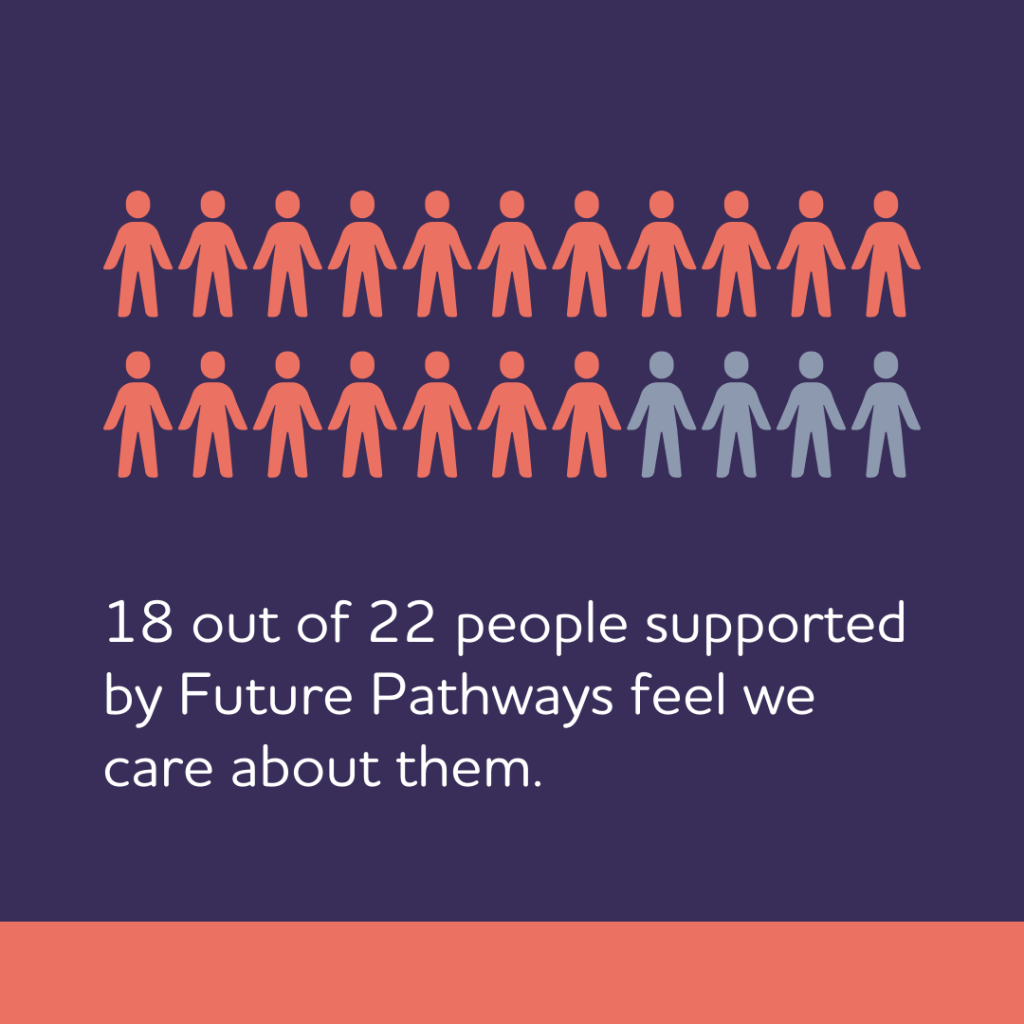
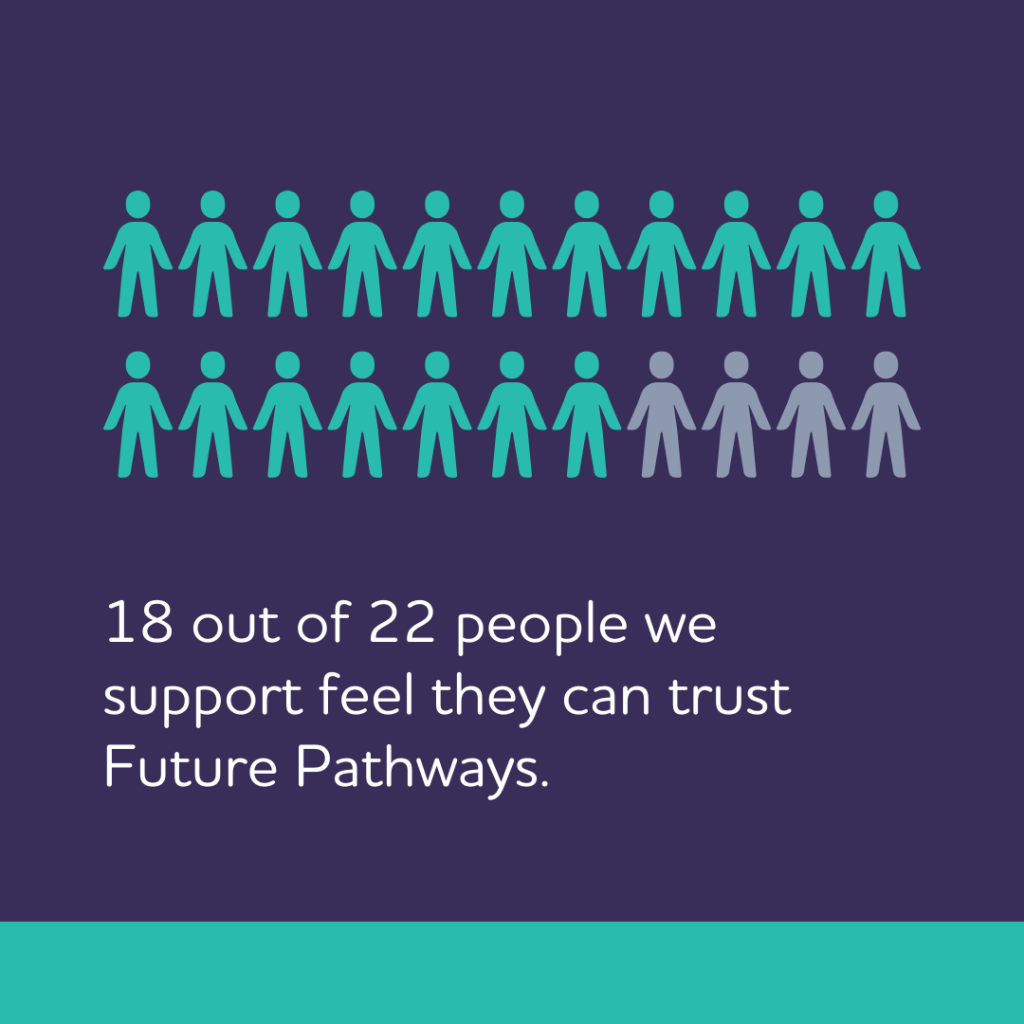
People continued to access a wide range of different types of support through Future Pathways.
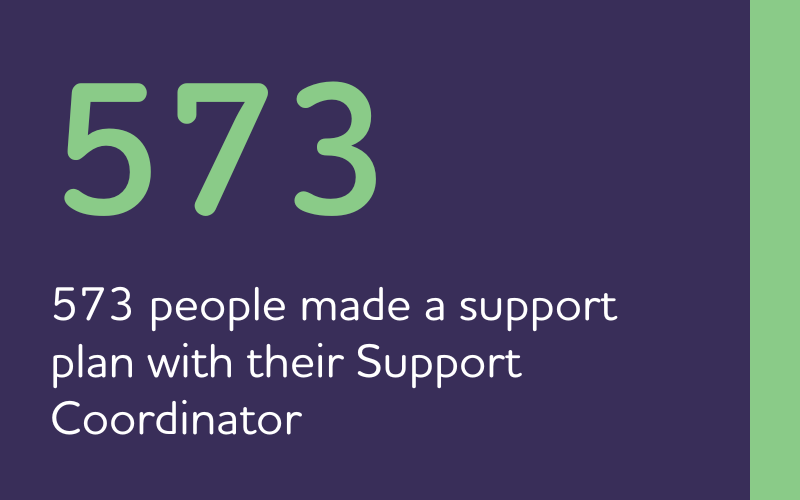
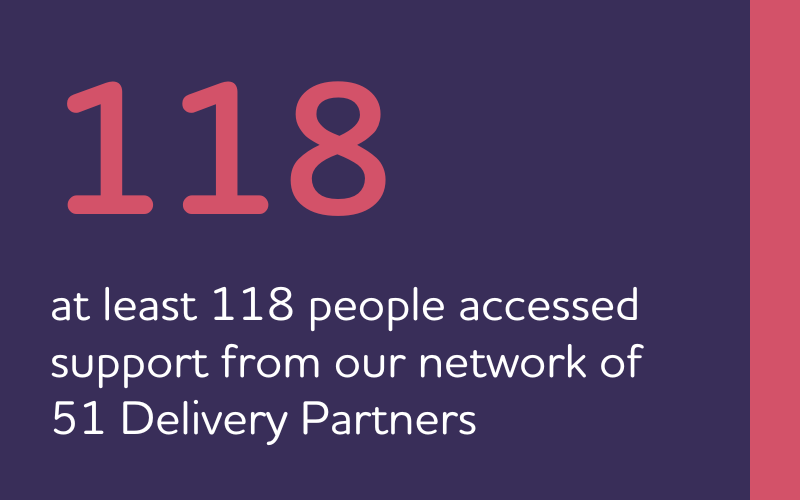
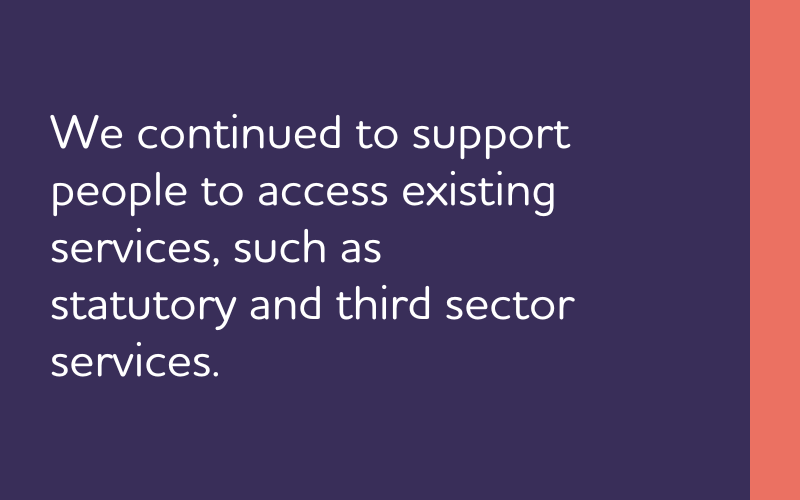
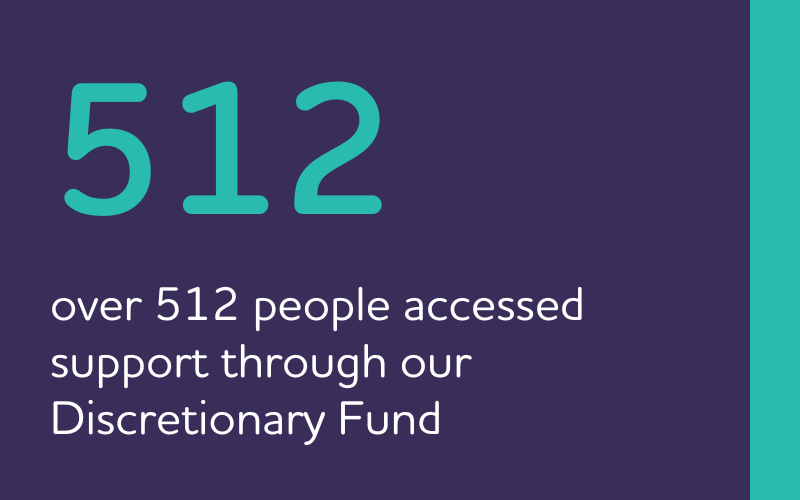
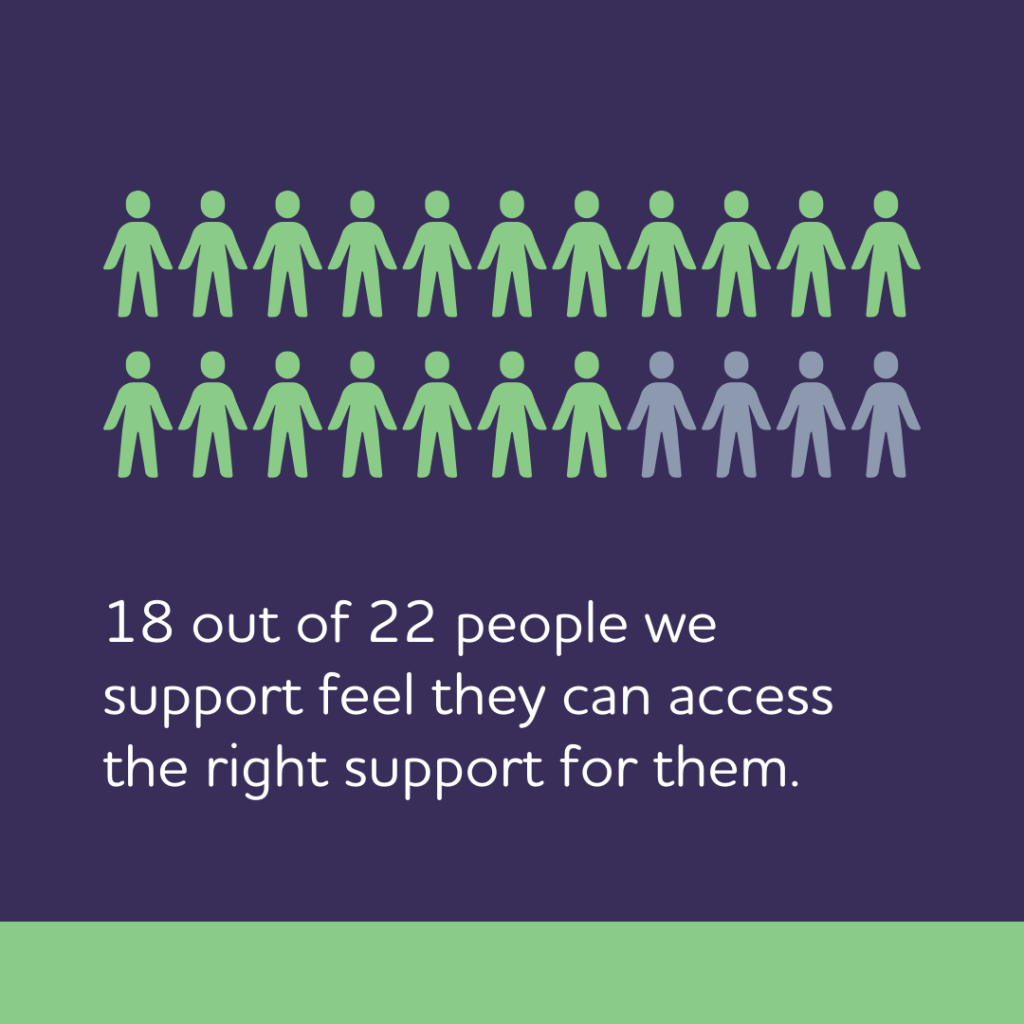
People continue to share that our work contributes to a big difference in their lives.
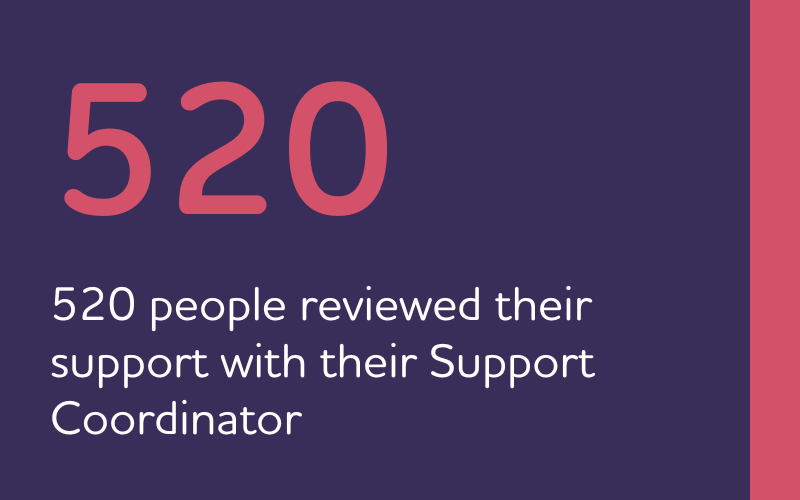
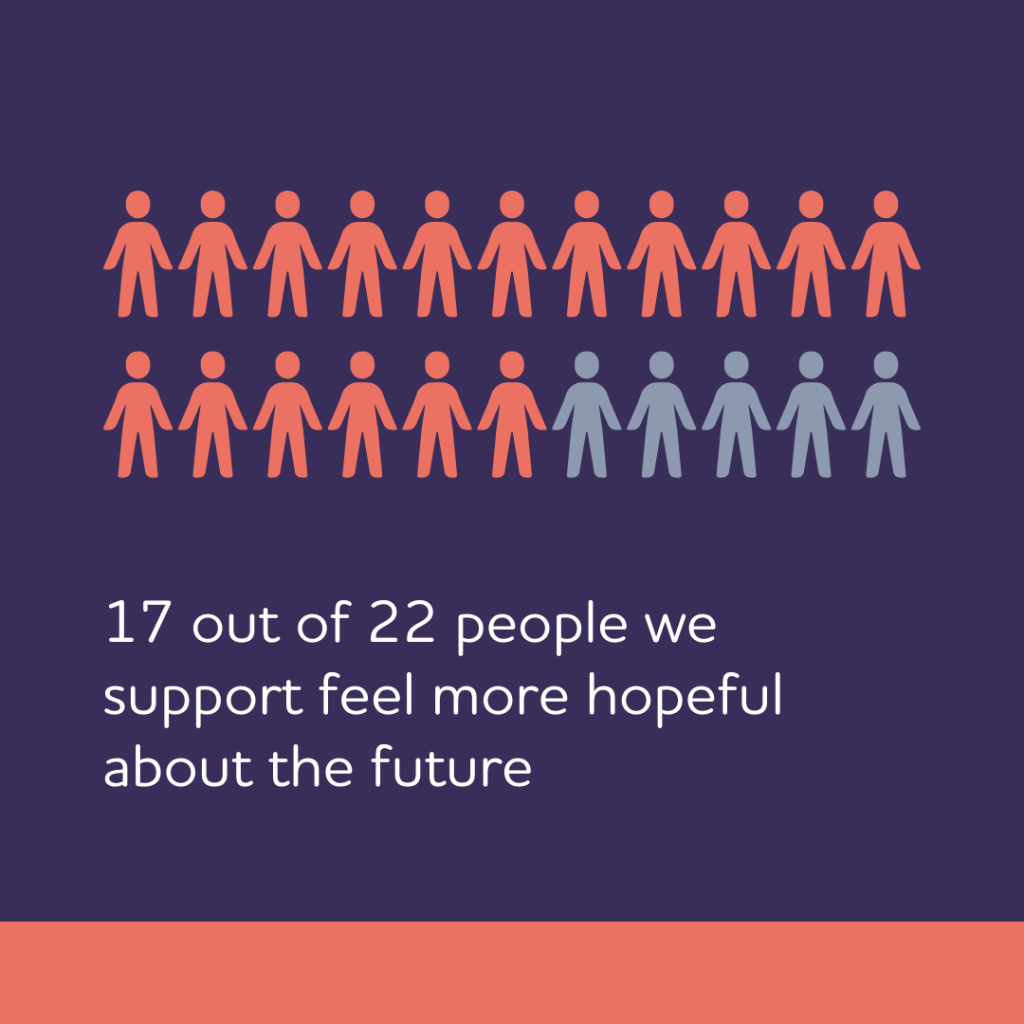
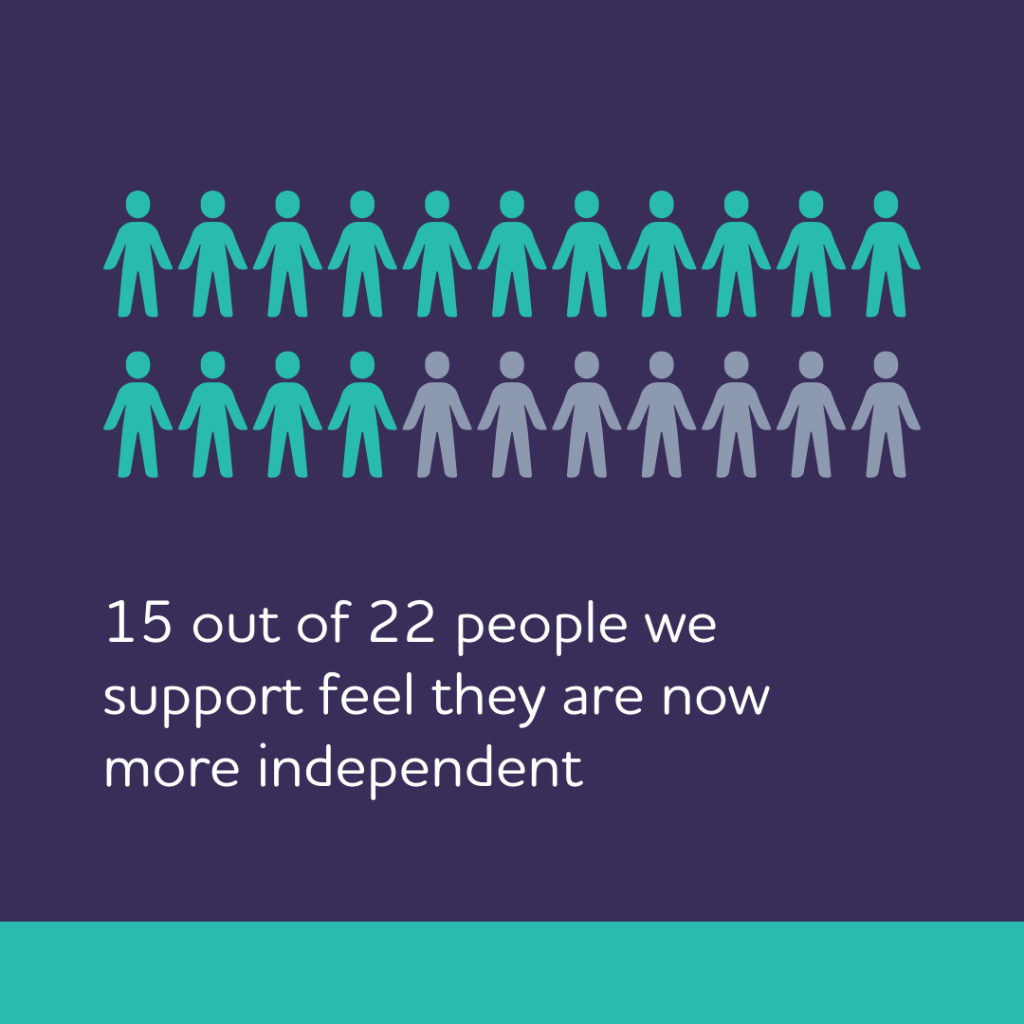
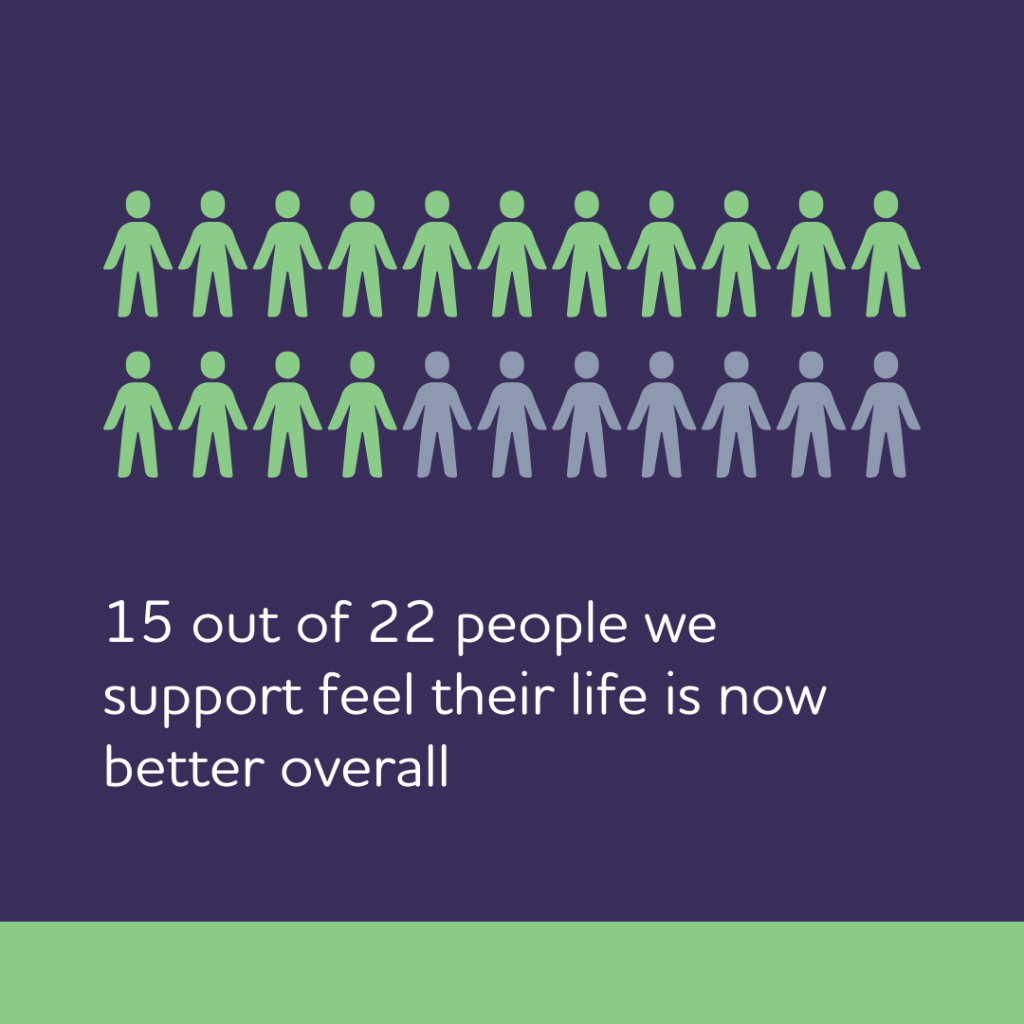
“Future Pathways […] provided all the necessary tools and support for me to make massive changes in my life. Future Pathways supported me in having a voice and I am forever grateful for the support emotionally and practically. This has given me the confidence to speak up for myself and all survivors and to progress forward with a sense of worth and purpose.”
(Person supported by Future Pathways)
The feedback we received has also helped us reflect on how we could improve.
In 2025, we are looking forward to:
- exploring what peer support will look like at Future Pathways
- creating more opportunities for people we support to influence how we develop
- learning more about the impact of our work with existing services, such as statutory and third sector services
Thank you to everyone who has taken the time to share their experience with us this year. Your feedback helps us understand the impact we make and to keep learning and improving.
Find out more about the difference we make.
Pathways to Change is our latest impact report. Here, we take an in-depth look at the work of Future Pathways from April 2023 to March 2024. This report helps us to gain a deeper insight into how we make a real difference, and where there is scope for improvement.
We want to hear from you
You can give feedback about Future Pathways at any time by filling in the form on the website: www.future-pathways.co.uk/feedback
If you would like to get a copy of the feedback form by post instead, you can let us know by:
- emailing engagement@future-pathways.co.uk
- phoning us for free on 0808 164 2005 (open Monday-Friday, 10am to 4pm)
- writing to us at Future Pathways, 40 Shandwick Place, Edinburgh EH2 4RT
- speaking to your Support Coordinator
If you fill in a feedback form, the answers you give will be anonymous. This means that you do not have to provide your name or any personal details.
We are pleased to share our latest report The Meanings of Funded Support. This looks at key aspects around our Discretionary Fund (which offers funded support to people working with us).
We see how accessing funded support can help people achieve their goals, work towards their outcomes and create change in their lives. We also look at the complexities around accessing funded support, such as the ways negative self-perception or complicated interactions with money can create barriers and prevent equity.
The report draws together learning from previous evaluations, such as how we manage funded support in an accountable and equitable way, and how funded support can make a difference. It was also prompted by reflections from within the Future Pathways team around the challenges that can arise when supporting someone to access funding. For example, discussions around funding can, in some instances, detrimentally effect the relationship between the person and their Support Coordinator.
The context within which people access material support at Future Pathways is nuanced. A person’s financial circumstances and relationship with funded support can be affected by their previous experience of trauma. We must, therefore, be aware of such barriers and how we might achieve equity for people we support. This is particularly important in the context of working with people who may have experienced multiple inequalities in their life, and who may have conflicting feelings about accessing funded support.
Given that relationships are at the core of our support, it is vital that we acknowledge the complexity, nuance and dynamics involved in accessing funded support. We see that prioritising transparency, self-awareness and active listening can help mitigate potentially negative experiences of associated with accessing funded support.
This is especially significant given that we know that funded support can make a real impact in people’s lives. It can support a person in achieving their goals and reaching their intended outcomes, such as improving overall wellbeing, self-worth, self-esteem and confidence, and gaining increased independence and freedom.
We hope that our Delivery Partners and other services that work with people accessing funded support or financial payments may also benefit from our learning. By looking in-depth at how people access funded support, and acknowledging the multiple complexities involved in this, we can work towards ensuring that people can access the support they need, tailor our support to ensure greater impact and help people make the changes they wish to see in their lives.
“It was huge. Future Pathways have been able to help with things I never thought they could help with. A lot of other services I have worked with could only listen. Nobody was able to do something. Future Pathways really did make a tangible difference in my life.”
(John, Person supported by Future Pathways)
“The cinema membership encouraged me to leave the flat and venture into town. When the cinema was quiet, I felt safe, like I didn’t need to scan the place. Then, I started going to other places in the city like the Gallery of Modern Art.”
(Anne, Person supported by Future Pathways)
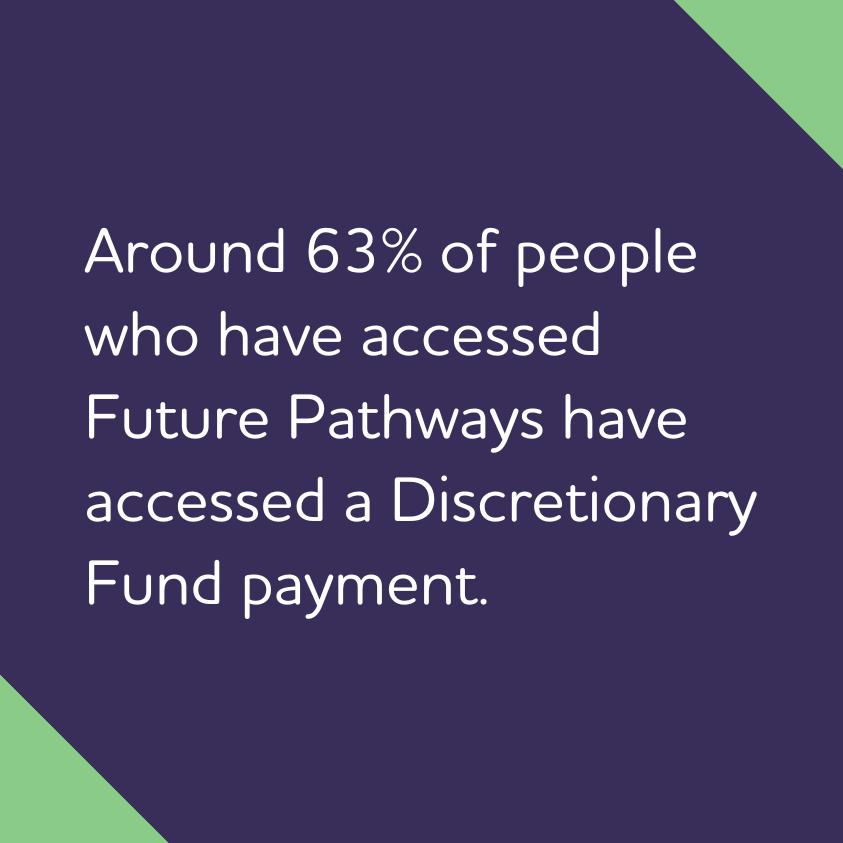
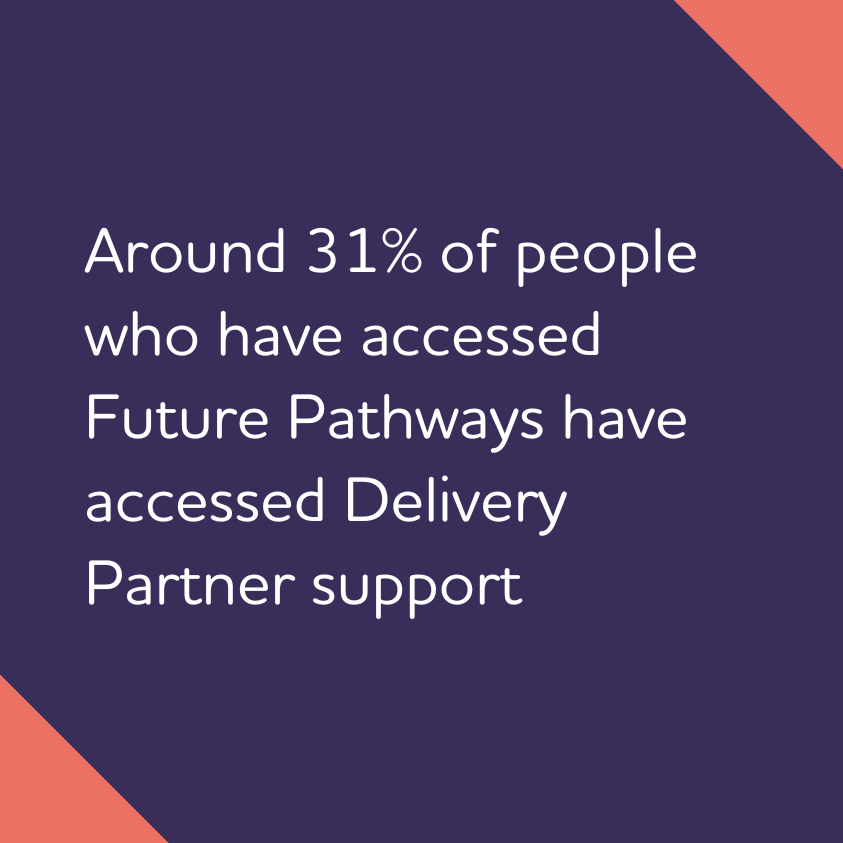
DISCOVER MORE
In our latest impact report, Pathways to Change, we highlighted how data-driven improvement can help us to see how we can make a difference, map our influence and, crucially, further improve the support we provide.
Here, Louise Hall, our Impact and Evaluation Lead, looks at what we mean by data driven improvement and how we see it in action.
At Future Pathways, one of our service outcomes is to help make sure that people registered with us can access the right support for them. One of the ways we work towards this is by continuing to learn about our support. This includes what works well, how support can be improved, and the impact we have.
Over time, we have designed a bespoke way of assessing the quality and consistency of our support. We call this our Quality Framework. We use this to look at evidence from across the service so we can see:
- What is working well about our support
- The progress we are making
- Any gaps in our practice and processes
- How this impacts people’s experience at Future Pathways
- The steps we can take to improve
- The resources and/or guidance we might need to make changes
Our Quality Framework helps us feel more confident in what we learn through our impact evaluation and, together with our impact evaluation, it helps us make data driven improvements to our service.
Data driven improvement means pulling together different types of data from across the service – such as support plans and Delivery Partner contracts – to find out how we could improve. And it means using our evidence to inform and direct the changes we make at Future Pathways.
When we identify that something needs to be improved, we work together to make changes that will work practically and make a difference to people registered with us. Often, groups comprising team members from across the service pool their expertise to explore options and find the right way forward.
For example, since 2021, we have been working on improving our data system, Carista, to improve the efficiency of our processes. A group of Future Pathways team members have been working together, alongside our partner Rockpool Solutions, on this improvement project. The changes we have made so far have had many positive impacts, such as helping to make it easier for people to register for support, and giving us more confidence in our data.
We also seek input from Voices for a Better Future, our lived experience voice group. For example, last year members of the Voices for a Better Future group worked with us to co-design what peer support could look like at Future Pathways. Now, we are starting put the ideas of the group into action. We will share more about the peer support opportunities we will develop for people registered with us next year.
We have also worked with Voices for a Better Future to improve how we ask people registered with us for feedback and equal opportunities information. With input from people with lived experience and team members across the service, we launched our new approach to feedback and equal opportunities in 2023. Now, people registered with us have more ways to give us anonymous feedback about their experience. And we ask for sensitive equal opportunities information later in support, when people have had the time to build up some trust with their Support Coordinator.
We will continue to leverage our Quality Framework to drive improvement at Future Pathways. For example, our Quality Framework and impact evaluation findings showed that we could improve how we facilitate conversations at the start of support about what matters most to people registered with us. Given that all our support is tailored to each person’s own outcomes, we know that these conversations are important; they help us make sure that people can access the right support for them. So, a group of team members from across the service is working on this now.
It is our hope that by continuing to make positive changes and sharing the improvements we make, people can access the right support for them at Future Pathways and other services.
DISCOVER MORE
In this resource, you can read more about how we embed the principles of trauma informed practice into our approach to quality and improvement at Future Pathways.
At Future Pathways, we aim to take a trauma informed approach to every aspect of our work. Our impact evaluation shows that in doing so, we support people to gain a sense of purpose, freedom and independence; and we help make trauma informed support more accessible to people registered with us.
This guide is ideal for people who are interested in:
- evaluating complex relational and trauma-informed approaches.
- measuring the quality of your work and identifying improvement actions in a trauma-informed way.
- refining your approach to quality measurement so that you are focused on what matters most to your service.
Our first Quality Framework Annual Report was created in collaboration with staff from all areas of Future Pathways.
This overview of the year (2023/24) draws on our quarterly quality checks to give a holistic picture of the quality and consistency of our support. The report highlights the significant work of staff in driving improvement and maintaining quality.
Find out more about how our quality framework contributes to our overall evaluation, helping to show the difference we make and how we make that difference.
